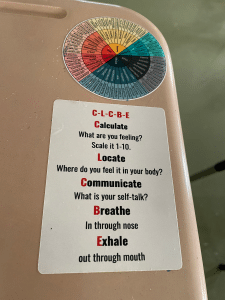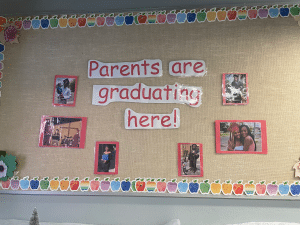Grounding in Community: The Aurora Team Visits EQA Schools in NOLA
CompetencyWorks Blog
On a sunny Thursday on the eve of the first 2024 Mardi Gras parades in New Orleans, the Aurora team piled into ride shares that pulled up to the Hyatt (site of #Aurora24!) for an 11-mile ride to The NET East High School and The Bridge Middle School in east New Orleans. Both schools are part of the EQA (Educators for Quality Alternatives) Schools program portfolio, which includes three high school campuses, a virtual learning program, a HiSET program, and a therapeutic middle school. This site visit was the first to include the full Aurora team. Our goals for the visit included:
- Experience a learning community as a team to norm around a shared Aurora vision of transformative practice and deepen our understanding of the opportunities and challenges in implementing student-centered change on the ground
- Ground ourselves in one part of the NOLA learning ecosystem to think about how we might create responsive Symposium connections (for Aurora Institute Symposium 2024 in NOLA Nov 3-5, 2024)
- Connect our hosts to relevant resources and offer ideas and feedback as is helpful
In this post, we’ll start with background on The NET: East and The Bridge, and what we saw and felt during our tour. Next, we explore the foundations of relationship-building and wraparound services that support what we saw. Finally, we examine the ultimate vision for learning that EQA is working towards, where they are currently, and some aspirations. 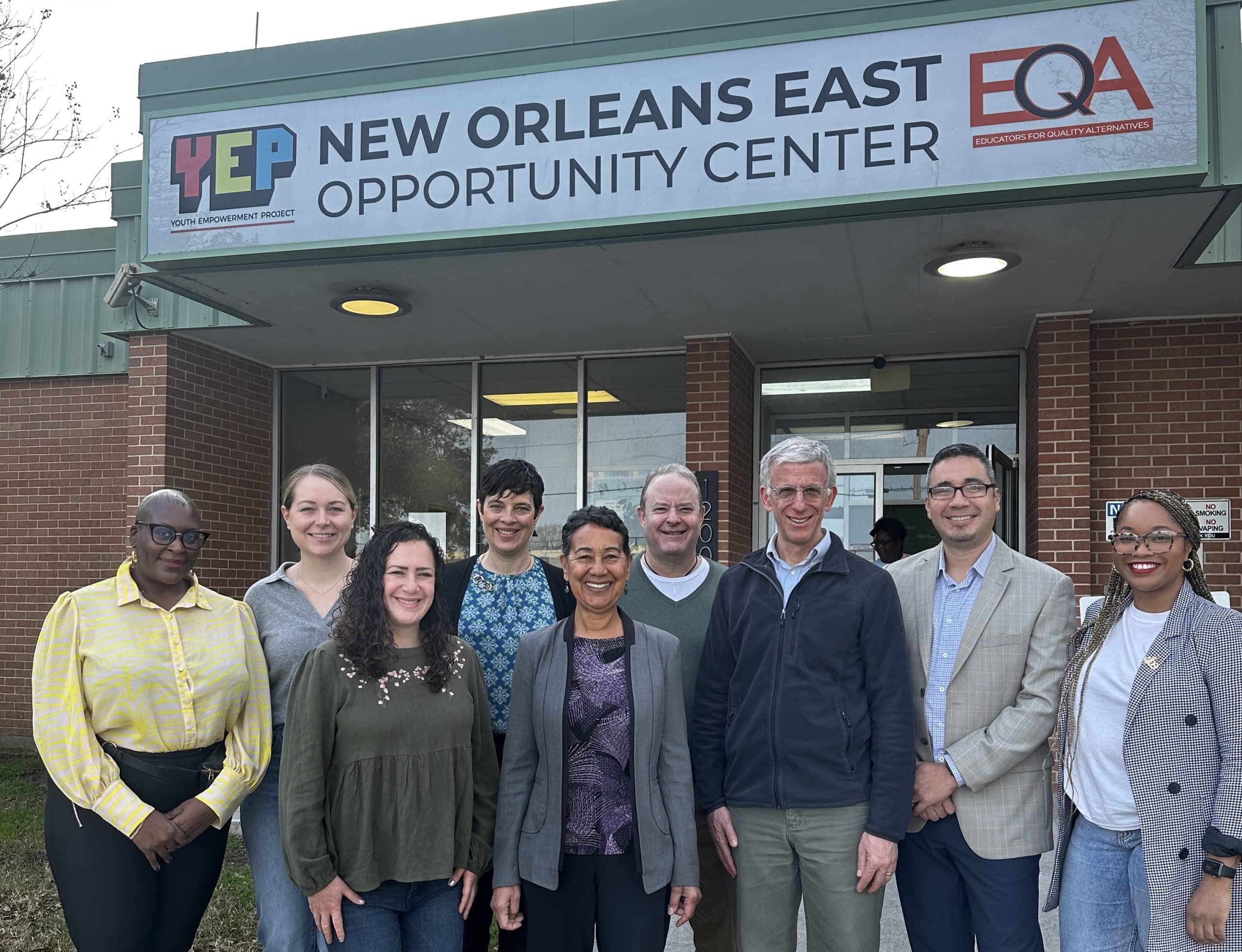
In Service of Their Learners, Inspired by Big Picture Learning
The mission of EQA Schools is to “provide ALL students with the skills, confidence, and experiences necessary to succeed in the education and career paths of their choice. EQA programs are built on the belief that alternative schools should not punish or “fix” young people; they should be vibrant, flexible, and restorative environments that support students in being their best selves.” The year-round program is “designed to meet students where they are, provide them with academic, career, and life training, and raise their own, their families’, and society’s expectations of their abilities and their future prospects.” The majority of the student population has not been effectively served by the traditional system.
EQA is a Big Picture Learning affiliate that uses the BPL design principles as a model to aspire to while also prioritizing the immediate needs of their learners and the state-level testing requirements for a high school diploma. The core beliefs and structures include:
- Strong relationships with caring adults
- Individual learning plans that address individual gaps, strengths, and goals
- High expectations for academic, behavior, and future success
- Authentically engaging, hands-on curriculum
- Multiple layers of academic, behavioral, social, and emotional support
- Real world connections
- Restorative approaches
Their team emphasized that they are still in progress. Still, we were impressed by their thoughtful codification of learner-centered practices, such as in their EQA Project Based Learning Continuum moving from teacher-led projects to student-led and community-based projects as well as their Real World Learning Manual.
 Engagement through Cultural Responsiveness and Mutual Respect
Engagement through Cultural Responsiveness and Mutual Respect
Throughout the school, we saw visual reminders of EQA’s commitment to creating a positive and affirming environment. The physical spaces feature pictures of graduates and inspirational bulletin boards offering affirmation. Walking through the hallways, the staff and the students that we passed greeted us. In classrooms, support for developing skills with accessible tools like the feelings wheel and C-L-C-B-E recasting steps illustrated an intention around the environment that complemented music and artwork that reflected students’ backgrounds.
Aurora’s Research Director Jilliam Joe reflected, “I appreciated how thoughtful and caring the teachers were even for those students who were disengaged or tired, how thoughtful they were about bringing them back into the conversation, bringing them back into the discussion without being punitive or shameful.” Our Communications Associate Jazminn Williams added, “In other schools I’ve been in I’ve seen teachers focus on, ‘Hey, take your glasses off, take your headphones off, take your hoodies off.’ [Here] the learning was the most important thing in a moment. So I really appreciate that a lot.”
Prioritizing Relationships and Centering Human Needs
Relationships form a foundation for EQA schools. Many students come to the school due to being expelled or wanting to drop out from another school, especially at the middle school. From the start of contact, EQA’s systems help staff get to know both the student and their family. They start with an initial meeting and a home visit, which Executive Director Elizabeth Ostberg says, “The goal is to reassure everyone that this is not the end of the world, it’s a nice place.” They also set up extensive interviews with the counselors and other staff members at the former school to build a picture of the student and their situation
Once a student is enrolled, the focus is on creating a positive culture. There is near daily contact with someone from every student’s family, addressing chronic disengagement from school and creating opportunities for meaningful learning. Structures like student-led conferences support students to gain the skills they need to use their voice and advocate for themselves – both at The NET: East and The Bridge and going forward. In some cases, where there may be safety concerns or larger community issues, there are additional partners that can help facilitate needed conversations beyond the school.
Thoughtfully designed wraparound services abound. Offerings from mental health services to on-site child care aim to support students so that they can focus on their learning. Aurora CEO Virgel Hammonds appreciated the school’s “focus on human needs and growth in the learning community, with genuine care and pride in learners’ progress.” In the staff professional learning and onboarding process, there is a focus on building capacity and consistency in using restorative practices.
Real World Learning: Projects and Career Experience
The foundation of relationships and support allows students to engage in meaningful learning – sometimes shifting from a very different experience in schools. While there are constraints to navigate – from Louisiana state course requirements to a wide variation in skill levels of the students – the team is committed to meeting students where they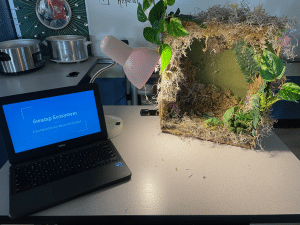 are in their learning and supporting them to engage in relevant, age-appropriate concepts.
are in their learning and supporting them to engage in relevant, age-appropriate concepts.
In a middle school classroom, we had the opportunity to be an authentic audience for student presentations on ecosystems they had researched. We asked questions, rated students on the project success criteria, and offered feedback along with the other students in the audience. Having clear criteria that the students use to give each other feedback fosters metacognition and awareness of the learning goals, including the academic concepts, such as the accuracy of the content, and transferable skills, such as presentation.
Wherever possible, academic skills and content knowledge are built in concert with an exploration of career pathways and individualizing through interests. For example, in a visual media project-based learning class we observed, one student might focus on an English language arts-related product, while another might create something that aligns with the requirements for an art elective. Where there is an opportunity to align experiences to required course credits, that is preferred over online credit recovery programs. Neil Poynter, Chief of Schools for EQA, shared, “from a school-based progression angle, we are trying to think about every place that we can help a student quantify and assess their learning in ways that match with standards to their progress. …From the kids’ side, I think we’re trying to lead that from an interest and a passion place. Is it something certification- and job-connected? Or is it just exploratory – something I’m really interested in? And if you’re going to explore, then can I connect that to some of the things that really feed your pathway?” A project-based learning soft skills class prepares students to be ready for more self-directed projects and work-based learning internship opportunities, such as through YouthForce NOLA.
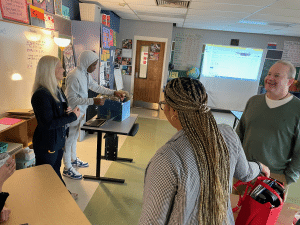 Sharing Ideas for Reciprocal Benefit
Sharing Ideas for Reciprocal Benefit
Fruitful site visits offer reciprocal benefits and takeaways to the visitors and the hosts. Aurora was able to provide a mirror to reflect where we saw evidence of engagement and backwards design goals, and hopefully offer some lenses for future directions to expand and help make the existing practices evolve towards a more fully realized vision. In our debrief discussion, we discussed how to enhance learner ownership and mutual accountability. We shared ideas for sources of projects and performance assessments to adapt and lower the burden on teachers to plan curriculum from scratch. We offered our thoughts on the EQA team’s question of how to approach the codification of projects – whether through common structures, products, or learning experiences.
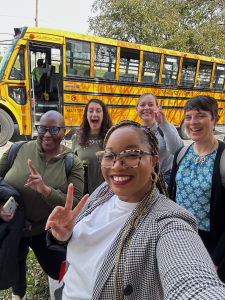 For the Aurora team, our decision to hold our retreat in New Orleans held several intentions. The Aurora Institute Symposium is a national conference, but we have committed to grounding it in place in the city where we will gather (both in 2024 and 2025). In addition to Symposium benefits, some Aurora team members do not get to be in schools on a regular basis, depending on each of our roles. Having a shared experience is a touchstone and point of calibration about what environments can look like and how we help show what is possible in a reimagined future. Visiting a school together helps us to be thoughtful about how the current realities of schools can make changes difficult and think about how we can build coalitions that bridge today to tomorrow and beyond, to truly build a new dawn for every learner.
For the Aurora team, our decision to hold our retreat in New Orleans held several intentions. The Aurora Institute Symposium is a national conference, but we have committed to grounding it in place in the city where we will gather (both in 2024 and 2025). In addition to Symposium benefits, some Aurora team members do not get to be in schools on a regular basis, depending on each of our roles. Having a shared experience is a touchstone and point of calibration about what environments can look like and how we help show what is possible in a reimagined future. Visiting a school together helps us to be thoughtful about how the current realities of schools can make changes difficult and think about how we can build coalitions that bridge today to tomorrow and beyond, to truly build a new dawn for every learner.
Learn More
- Learning in a Supportive Community at Clark Street Community School
- The Power of Work-Based Learning in Competency-Based Education
- Metaphors for Change from Timpanogos High School
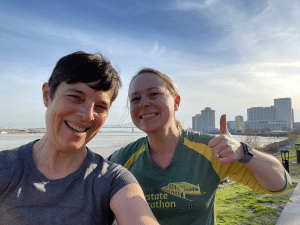 Laurie Gagnon is the CompetencyWorks Director and Chiara Wegener is the Communications Director for the Aurora Institute. In addition to collaborative writing projects, they both also enjoy running as a way to stay healthy and explore a new place.
Laurie Gagnon is the CompetencyWorks Director and Chiara Wegener is the Communications Director for the Aurora Institute. In addition to collaborative writing projects, they both also enjoy running as a way to stay healthy and explore a new place.
